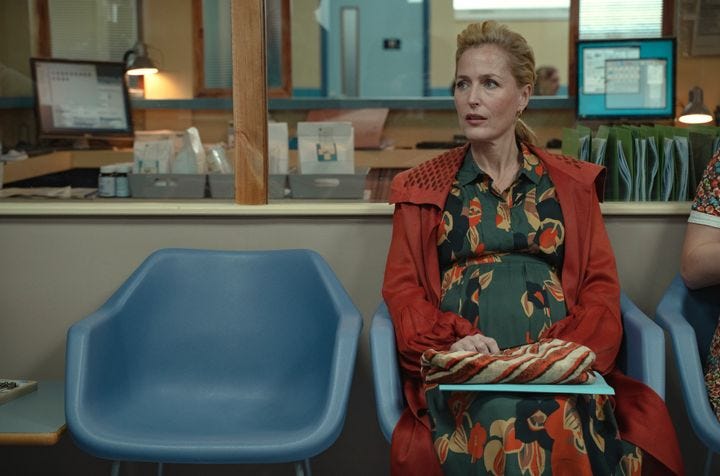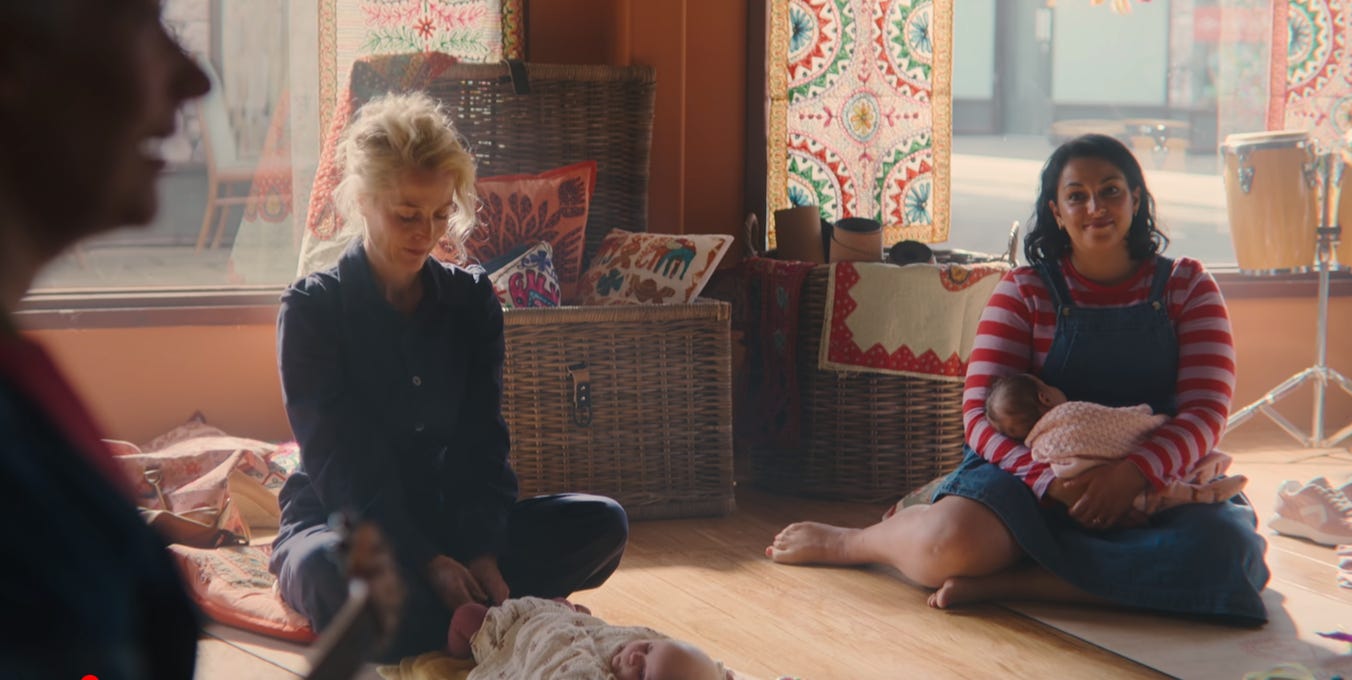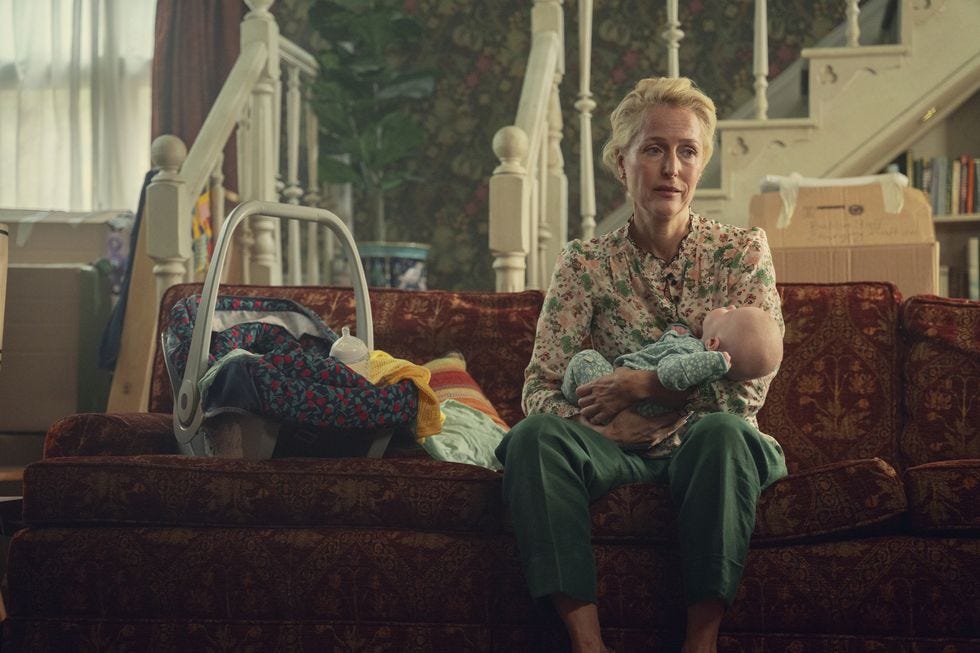Why is no one holding Jean?
Thoughts on Sex Education season 4 and unpacking postnatal depression and support
This is a reader supported newsletter. If you are able, please do consider becoming a paid subscriber. Your support helps fund our writing here but also all of the free-to-access support we provide weekly at The Women’s Health Hub.
We are so hugely grateful to you for being here.
Hi loves,
This newsletter is chatting about Sex Education Season 4 a bit. It’s all good if you don’t watch it, it’s still an important piece and will make sense. But if you do watch and haven’t seen all of season 4 yet then maybe circle back later!
For those of you who have never seen it, Sex Education is a Netflix teen drama which follows the story of teenager Otis, his sex therapist mum, Jean, and lots of other characters, all exploring their own sex and relationship ‘stuff’. It’s a series I always really enjoy watching and Season 4 was no exception. This season in particular felt special - witnessing trans love and joy on TV is still no regular thing and was beautiful to see.
For all of the first two season’s, Jean is often presented as being this quirky but accomplished and strong woman. She appears to juggle being a good mother to Otis whilst also having a thriving career. It’s inspirational. However, this all goes down the toilet in later seasons as Jean discovers she is pregnant at the end of season 2. There was a lot of push back from her birth story in season 3, with Jean prematurely birthing her baby girl in a traumatic, near-death experience. This story line missed an important opportunity to showcase physiological birth and added to the media-pushed narrative that birth is inherently dangerous. That as an aside though, I’m not here to add to that narrative or to complain about the show in and of itself.
As a mother, and as someone who supports women as they transition into motherhood, I found Jean’s storyline in Season 4 hard to watch. The season opens with Jean in her early postpartum days, juggling single-parenting a teenager alongside caring for a newborn, recovering from birth, being a homeowner and wanting a career. It wasn’t that the creators had missed the mark, as some would argue with season 3, but it was precisely the fact that they captured that newborn isolation so perfectly. And it was a hard reality to witness.
The makers of Sex Education put forward a sad but honest portrayal of early motherhood. With Jean struggling to keep up with her physical recovery, whilst figuring out and getting to know her new baby, whilst trying to continue on in the world and not have her career thrown in the bin. Watching her do this, with little to no support, watching her struggle and seeing that struggle put back on her as a personal failing or a sign of depression, instead of a need for more hands on support was just heartbreaking.
Why do we do that to new mums?
There is a particularly hard scene in episode three where Jean takes her baby to a baby music class. The class facilitator asks everyone to go round the circle and introduce themselves. Jean takes this as an opportunity to voice some of the struggle she’s been carrying around with her, alongside her baby, only to be met with silence. The expectation being that you answer with your name and a fully benign, pointless fact. You should never use that space to delve into your darkest needs and struggles. You must never say too much, or mention the loneliness, or the sleep deprivation or the fact you sometimes lie there at night and wonder what the eff you’ve done.
No, the expectation is always that you’ll just portray a ‘normal’ version of you, hiding the cracks with smiles and copious amounts of foundation. And Jean had broke all of those rules and was made to feel shame.
Why are these groups set up that way?
And how many of us know the loneliness that comes from sitting in a room full of adult women like that, feeling like you’re the only one struggling. Like they’re all in some sort of club you haven’t been invited to?
The rage I feel, then, as the narrative to all this is so focused on Jean ‘getting help’ despite none being actually forthcoming and all of the work of finding and receiving help being on Jean.
Further on in the season, Jean is seen struggling at the GP, and despite a clear lack of support, after an early attempt to go back to work and so much stress - Jean is told she may have postnatal depression and she may need medication. No one comments whether she maybe just needs a bit more help at home. Or maybe she just needs a safe space where she can just voice her issues instead of sitting in a baby class singing stupid nursery rhymes with a bunch of strangers who judge her tears. Instead she’s sent off with a prescription for SSRIs and, as viewers, we’re meant to be overjoyed she got the help she needed.
I call bullshit.
Not on the creators of Sex Education, who merely portrayed a common postpartum experience I’m sure many of us can relate to. But on a society that sees giving birth and bringing new life into this world in the same field as going and doing your weekly shop at Lidl. And who expects us to manage postpartum and move on with as much ease as if we’d just got home from said shop. Sure, it can be hard to get round and the checkouts are a bit stressful but it shouldn’t take you too long to put it all away and move on once you get home.
The storyline which put Jean/ mine/ your experience really into perspective was that of Otis’s love interest, Maeve following the death of her mum. Throughout all of the seasons we have got to know and love Maeve as a complex character with a difficult history and season 4 is a hard one for her as we see her having to leave her hard won study abroad placement to return home.
Grief and death are still huge taboos in our culture and yet, in this TV series at least, we see Maeve showered in love, care and support by Otis and her best friend, Aimee. Following her mothers death, it is accepted that Maeve will be sad, accepted she may behave differently, may struggle. It is accepted that Maeve needs extra attention and space to talk and to process and to grieve. Both Otis and Aimee sleep on Maive’s floor in the following days. They do ridiculous errands for her, like collecting a funeral display with only a push bike for transport, and they excuse her sometimes poor behaviour.
No one tells Maive she may be ill and may need medicating because her mother died. An attempt from her college to ask when/ if she will return is met with rightful indignation. As she needs time to grieve and process. She is held, she is supported. And yes, what she goes through is immeasurably hard but, the point here is, she is never made to feel guilty or less than for finding it that way.
I’m not saying having a new baby is the same as having your mum die. Yet it still is a huge life event which takes time to recover from. Your hormones are haywire, making it hard to be rational all of the time. Your body may feel broken or at least a bit wobbly. Babies and toddlers are hard as hell to look after and keep alive. And yet we never see new mums on the TV being given any level of understanding or support with any of that. And we’re meant to applaud depictions of postnatal depression, as if we’re breaking a taboo. But what makes us so sure that those characters would still feel so low if they had any sort of help or support?
The scenes where Maive was held through the transition of grief and the loss of her mum were beautiful to watch. What I’m asking is, really, why couldn’t Jean have the same?
When will we get that level of support for motherhood? Even if it is just on a TV screen and not in real life.
When will we start holding mothers properly? Showing them that their mood swings and their anger and their tears can be normal responses to postpartum. Holding them whilst they struggle with the sound of their baby crying or with learning how to breastfeed or with worrying about awake windows or solid food or returning to work. When will we allow them to fall apart a bit in the transition without bringing the constant added anxiety that they may be on the precipice of a deep depressive episode?
Yes, having a baby is magical. But it’s also really fucking hard. Especially if you have little family support, are a single parent, or neurodivergent, or disabled or you don’t have the support of your employer (or indeed have an employer at all) to take the time you need.
It’s okay if you’re not feeling 100% amazing and happy all of the time.
In fact, it’s pretty fucking normal.
And that doesn’t mean anything about the kind of mother you are.
It doesn’t mean anything about how much you love your kids.
Or about their future development. Or even about how you’re going to be feeling in a month or a year or five.
And it certainly doesn’t mean you are depressed.
And none of this is to deny anyone access to antidepressant medication, either in grief or postpartum. Nor access to a title of postnatal depression they may identify with. You do you. But it’s one thing to ask for and receive medical help when you feel you need it and a whole other story when it’s the social narrative that is telling you that struggling to do a very hard thing must mean you’re mentally ill.
And if we can’t even get that right in a TV show then that’s pretty depressing in itself.
If you relate to any of this, know that you are so welcome to ask for help, support, community.
Online - we have a regular connection circle on Zoom, the next one is Friday December 8th, from 6:30pm. You can see what we did last time here.
In-person - you can read more about my doula services here, and we also offer lots of free sessions at The Women’s Health Hub in Hartlepool - you can find the timetable here.
And if you just need a chat, you are always so welcome to contact me - either here, via email or over on the Postpartum Matters Instagram.
Sending you love and wishes of love and compassion,
Zoe xx









This is an incredible piece Zoe ❤️. The way you talk about grief and motherhood and how we honour grief but not motherhood is so true. Just love all of this and think it's such an important post. Especially liked the bit about society treating having a baby like doing the weekly Lidl shop, an excellent comparison!! ❤️
YES YES YES to all of this! I went to my doctor after taking self-diagnose PPD tests online that ranked me as "severe". I explained the tests, what I had been feeling, and their two responses were "do you think about harming your baby or family" (no) and "let's get you on depression medication." I was shocked but desperate enough to consider it. I had no history of depression and they didn't even check, they just sent in a depression medication prescription over one phone call with me. I grappled with the choice but ultimately decided to focus on natural methods (sun exposure, gratitude journaling, working out/yoga, CBD when things got worse), but constantly questioned if I made the right choice. Your comparison with someone grieving is EXACTLY PERFECT. Thank you for tackling this taboo subject of medication and no real help for moms struggling.